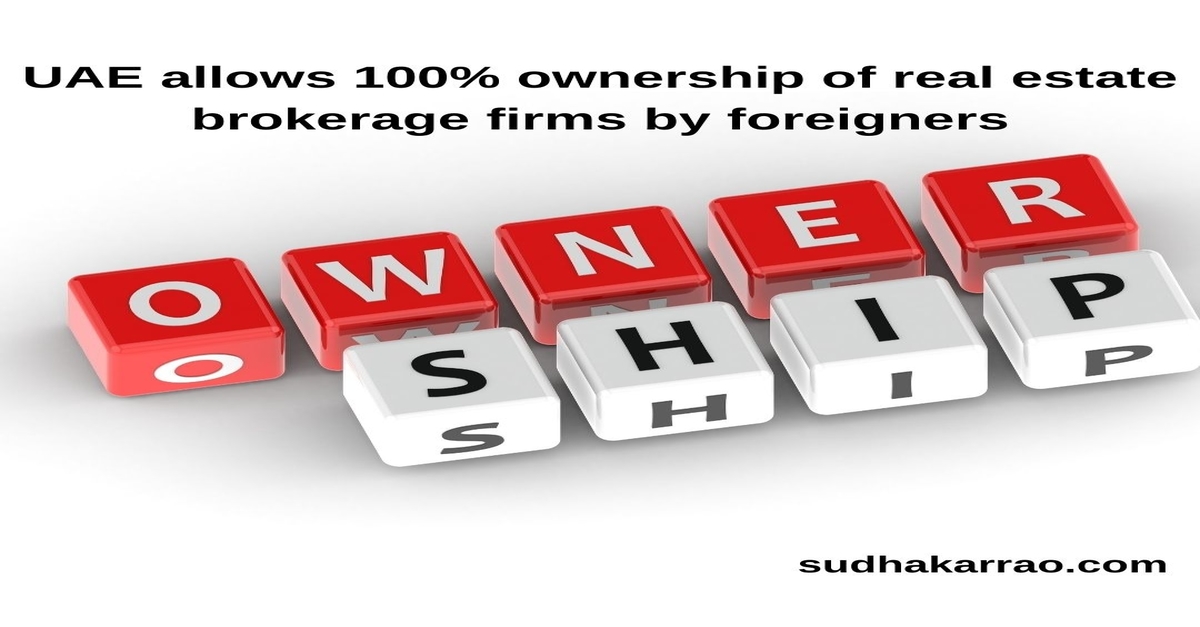UAE allows 100% ownership of real estate brokerage firms owned by foreigners: Impact and implications
On the 1st of June, 2021, the 100% foreign ownership reform came into effect in the UAE. This change in existing Company Law was heralded as a landmark in the growth history of the nation. The reform did, however, retain a few key business areas in the “restricted” category. These included education, audit, legal, healthcare, and real estate brokerage. One of the reasons behind this move was to buy time for decision making instead of deregulating hastily. A couple of months into the reform, the UAE has lifted real estate brokerage business from the restricted category, enabling foreigners/expats to hold 100% ownership.
Typically, foreigners were only entitled to 49% or lesser ownership rights in any company, be it real estate brokerage or otherwise. The Company Law mandated a UAE national/sponsor/partner with a minimum 51% stake in the business. Within the brokerage business, however, the majority of firms were operating with zero-foreign ownership, which was implemented to avoid cases where foreign brokers leave the country at the expense of transacting parties, misuse the license, or commit other fraudulent activities. So, the roles of expats and foreigners involved in brokerage businesses were largely limited to managerial or below C-suite levels. So, with the new reform, we can expect a paradigm shift from the status quo.
The impact
There are around 2,500 real estate brokerage companies in Dubai alone. So, the immediate knock-on impact could be the corporate restructuring in existing companies, with buy-in opportunities for foreigners/expats and buy-outs for local shareholders. There could be promotions and changes across the board — all efforts geared towards organizational efficiency and business interests. Externally, however, this reform could incentivize a host of foreign brokerage firms who were thus far sceptical to set up shop in the nation. Such risk-averse firms will be encouraged by the possibility of avoiding complex arrangements and legal liabilities associated with the pre-reform Company Law.
The restructuring and new entrants in the brokerage market have a direct bearing on the real estate industry. Especially in light of the ongoing Expo, which has increased activity across all economic sectors, the 100% foreign ownership reform is a timely and strategic move. The impact on the real estate industry can be anything from new firms leasing out commercial spaces to bringing potential investors to the market through their global networks. The UAE’s golden visas for property investments — with Dh750,000-worth property now accompanying a three-year visa(1) — complement these developments. That said, real estate brokerage firms are still subject to a few conditions.
Requirements under reformed law
Although expats/foreigners can now fully own brokerage businesses, they are still mandated to employ a Local Service Agent (LSA) who is a UAE national. The LSA need not be a shareholder in the company but a full-time employee at the bare minimum. This is to say, the new law also has a provision to boost the employment chances of local brokers. Furthermore, new firms must apply for a license at the Department of Economic Development (DED) to practice in the country. Also, they should get approval and a NOC through the Trakheesi system set up by the Real Estate Regulatory Agency (RERA). The Trakheesi system was set up to enhance transparency and uphold the ethos of honesty in brokerage transactions. These aside, the business owner need not take the RERA-sponsored examination, which is mandatory for agents.
The market health
The UAE property market is currently ripe for brokerage businesses due to upbeat buyer sentiment and steady post-pandemic recovery, along with Expo-driven activity. Supporting this claim is the official Q3 2021 data(2). Sales of commercial properties increased 34% year-over-year, and mortgage transactions were double that of cash ones. On the residential front, average sales price increased by 4% year-over-year in both Dubai and Abu Dhabi as demand increased.
Dubai property market has an inventory of 629,000 properties, with 23,000 new ones to be added by 2021(3). To this end, the deregulation of real estate brokerage could increase transactions, thus mitigating concerns of a market glut. Also, the influx of foreign brokerage firms and restructuring of existing businesses could increase competition in the industry, the outcome of which benefits the national economy.
- https://www.khaleejtimes.com/business/real-estate/minimum-investment-for-3-year-visa-cut-to-dh750000-in-dubai
- https://www.jll-mena.com/content/dam/jll-com/documents/pdf/research/emea/mena/dubai-commercial-property-price-indices-report.pdf
- https://www.jll-mena.com/content/dam/jll-com/documents/pdf/research/emea/mena/the-uae-real-estate-market-q3-2021.pdf




